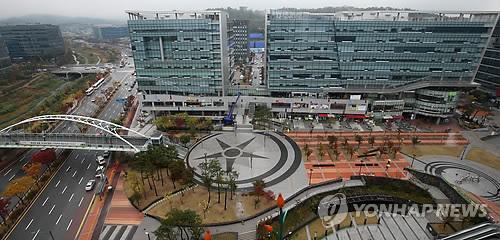Techno valleys in Korea are playing a pivotal role as hubs for technology start-ups as the government pushes to boost innovation through policy measures.
Pangyo Techno Valley in Seongnam, Gyeonggi Province, which opened in 2011, is one of the leading techno valleys in Korea.

It started small. Having only 82 companies in the 661,000-square-meter-large land, the first-year sales reached just 5 trillion won, ($4.3 billion).
Pangyo Techno Valley, however, soon drew a sharp growth as the number of companies surged to 1,121 this year, showing a 13-fold jump over the past five years, according to the Gyeonggi Provincial Government.
The sales of Pangyo Techno Valley also hit a record high of 70.2 trillion won last year, accounting for 23 percent of the province’s gross regional domestic product.
When compared with the gross regional domestic product of municipal and provincial governments, Pangyo’s sales level is ranked 7th, beating Daegu, Gangwon Province and Jejudo Island.
Of all the companies in Pangyo Techno Valley, 77 percent are found to be the Information technology, followed by bio technology with 12 percent and cultural technology with 4 percent. Nano technology companies only accounted for 1 percent of the total.
Challenges remain, as the sales performances depend heavily on conglomerates.
While about 91 percent of the companies are small and medium-sized businesses and less than 3 percent is conglomerates, most of the sales were drawn from the large firms such as SK Planet, Nexon, Kakao and NHN.
The combined sales of the nine top conglomerates recorded 36 trillion won, making up more than half of the total sales of Pangyo Tech Valley.
In addition to Pangyo, other cities are injecting their efforts to create distinguished models of techno valleys.
In Dongtan, Gyeonggi Province, where another techno valley recently opened, major large companies such as Samsung Electronics, 3M, Doosan Heavy Industries and Construction are establishing their bases there. The city has put efforts into establishing full infrastructure for high tech firms and knowledge-based manufacturing.
The government has offered tax cuts and low-interest loans for companies who set up shop in Dongtan. It is also expanding the transportation infrastructure, such as establishing a KTX station and providing more intercity express buses there. The new KTX route has allowed passengers to commute between Dongtan and Suseo in southern Seoul within 12 minutes.
Apart from running the techno valleys, the government has opened eight creative economy innovation centers across the country under different themes in order to support the fostering of promising start-ups in various sectors.
The Gyeonggi center focuses on fostering the information technology industries such as FinTech, games and the Internet of Things.
While the techno valleys have boosted growth in the tech industries, challenges remain for novice companies, especially the soaring office rental fees.
In Pangyo, the average office rental fee is around 30,000 won to 50,000 won per square meter, which is almost equivalent to that of Gangnam, an upmarket area in Seoul with rents of around 60,000 won to 80,000 won per square meter.
If a company rents an 80-square-meter office that can accommodate 10 workers in Pangyo, the monthly fee is 2.5 million to 4 million won, excluding the deposit and utility bills.
Some claim that the government needs to improve its long-term support measures to ensure the start-ups survive.
“There is a need to provide support for start-ups in a lump so that they can stably initiate their businesses. The support can be either direct or indirect, such as expanding low-price rental spaces,” a start-up owner in Pangyo said.
By Lee Hyun-jeong (
rene@heraldcorp.com)







![[Today’s K-pop] Blackpink’s Jennie, Lisa invited to Coachella as solo acts](http://res.heraldm.com/phpwas/restmb_idxmake.php?idx=644&simg=/content/image/2024/11/21/20241121050099_0.jpg)
